#Rabindranath Tagore Biography
Explore tagged Tumblr posts
Text
কবিগুরুর জীবনীর ওপর তৈরি হতে চলেছে ছবি
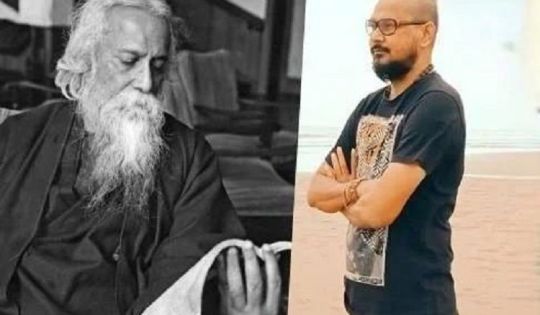
রবীন্দ্রনাথ ঠাকুর, ভারতীয় সাহিত্যে শুধু একটি নাম নয়, বরং সাংস্কৃতিক ও বৌদ্ধিকতার মূর্ত প্রতীক। তার জীবন এবং কাজগুলি বহু প্রজন্মকে অনুপ্রাণিত করে এসেছে। তাঁর সৃষ্টির ওপর ভিত্তি করে অনেক চলচ্চিত্র পরিচালক ছবি বানিয়েছেন কিন্তু এবারে, এক চলচ্চিত্র পরিচালক রবীন্দ্রনাথ ঠাকুরের জীবনীর ওপর ভিত্তি করে বানাতে চলেছেন ছবি৷ আসন্ন এই ছবিটি কেবল একটি বায়োপিকই নয় বরং এটি রবীন্দ্রনাথ ঠাকুরের আত্মপলব্ধি, দর্শনকে আরও তীক্ষ্ণভাবে পর্দায় তুলে ধরার প্রচেষ্টা। এই ছবিটি একটি অনন্য সিনেমাটিক অভিজ্ঞতার মাধ্যমে বিশ্বে রবীন্দ্রনাথ ঠাকুরের প্রভাব সম্বন্ধে একটি সামগ্রিক উপলব্ধি প্রদান করবে বলে আশা করা যায়।এই ছবির পরিচালক কে, কারা কোন চরিত্রে অভিনয় করছেন এবং এই ছবির ব্যাপারে আরও অজানা তথ্য জানতে ক্লিক করুন Rabindranath tagore biopic
#Rabindranath tagore biopic#রবীন্দ্রনাথ ঠাকুরের জীবনী#Kabiguru rabindranath tagore#বিশ্বকবি রবীন্দ্রনাথ ঠাকুর#rabindranath tagore biography
0 notes
Text
Recalling Rabindranath Tagore:Tradition of a Scholarly Goliath
Rabindranath Tagore, a famous writer, rationalist, performer, and craftsman, keeps on being a signal of motivation in Indian and worldwide writing. His significant effect on different aspects of culture, going from writing to workmanship and reasoning, has made a permanent imprint that rises above time. This article honors the demise commemoration of Rabindranath Tagore, thinking about his life,…
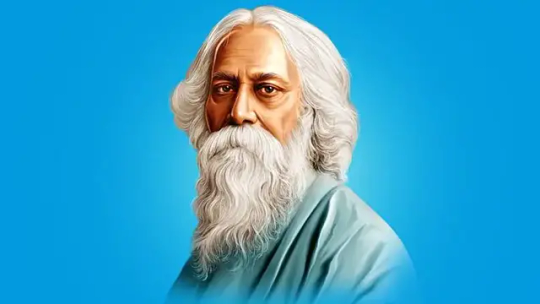
View On WordPress
#about rabindranath tagore#biography of rabindranath tagore#India glory#latest news#Rabindranath Tagore#rabindranath tagore biography#rabindranath tagore birthday#rabindranath tagore books#rabindranath tagore information#rabindranath tagore jayanti#rabindranath tagore poems in bengali#rabindranath tagore university#stories by rabindranath tagore
0 notes
Text
Gitanjali || Book by Rabindranath Tagore || Book Review || Prabhat Prakashan

Book Link : https://www.amazon.in/dp/9380186053
महाकाव्य का महत्व: 'गीतांजलि' नोबल पुरस्कार विजेता कवी रवींद्रनाथ टैगोर का प्रसिद्ध महाकाव्य है।
समाज के प्रति ज़िम्मेदारी: यह महाकाव्य समाज के मूल्यों और भावनाओं को उजागर करता है।
भारतीय संस्कृति का प्रतिनिधित्व: 'गीतांजलि' भारतीय संस्कृति और धार्मिक विचारधारा का प्रतिनिधित्व करता है।
सभ्यता का ध्यान: इसमें मानवता, संवेदनशीलता, और समाजिक न्याय के महत्वपूर्ण सिद्धांतों का मंथन किया गया है।
प्रेरणादायक रचना: यह महाकाव्य हर व्यक्ति को जीवन के महत्वपूर्ण मुद्दों पर सोचने के लिए प्रेरित करता है।
भावनात्मक संवेदनशीलता: गीतांजलि में उच्च भावनात्मक संवेदनशीलता का वर्णन है, जो पाठकों के दिलों को छूती है।
साहित्यिक महत्व: यह महाकाव्य भारतीय साहित्य के महत्वपूर्ण भाग के रूप में माना जाता है और उसकी महत्वपूर्ण कड़ी में स्थान है।
सांस्कृतिक विरासत का प्रतिनिधित्व: गीतांजलि सांस्कृतिक विरासत का महत्वपूर्ण प्रतिनिधित्व करता है और उसकी महत्वपूर्ण बातें आज भी उतनी ही महत्वपूर्ण हैं जितनी कि इसके रचना के समय थीं।
0 notes
Text
रवींद्रनाथ टैगोर जयंती : जीवन गाथा और उनकी 5 सर्वश्रेष्ठ कविताएँ
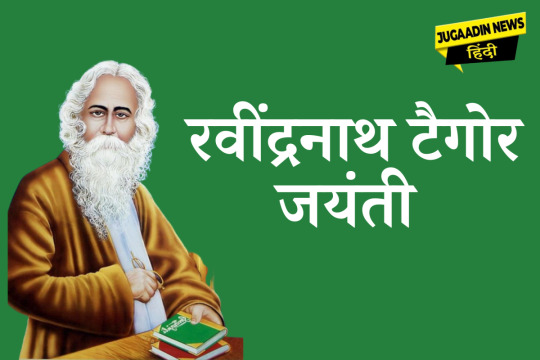
रवींद्रनाथ टैगोर का जन्म 7 मई, 1861 को कलकत्ता में हुआ था। रवींद्रनाथ टैगोर श्री देबेंद्रनाथ टैगोर और श्रीमती शारदा देवी के पुत्र थे। रवींद्रनाथ टैगोर जब युवा थे, तब उनकी मां का निधन हो गया। उनकी पत्नी मृणालिनी देवी थीं। उनके पिता एक यात्री थे और इसीलिए नौकर-चाकरों द्वारा उनका पालन-पोषण हुआ ।
और अधिक पढ़ने के लिए…
0 notes
Text
2024 Book Review #27 – From the Ruins of Empire: The Revolt Against the West and the Remaking of Asia by Pankaj Mishra
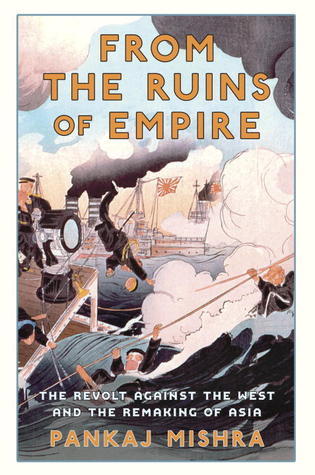
Yet another work of nonfiction I picked up because an intriguing-sounding quote from it went viral on tumblr. This was the fifth history book I’ve read this year, but the first that tries very consciously to be an intellectual history. Both an interesting and a frustrating read – my overall opinion went back and forth a few times both as I read and as I put together this review.
The book is ostensibly a history of Asia’s intellectual response to European empire’s sudden military and economic superiority and political imperialism in the 19th and 20th centuries, though it’s focus and sympathy is overwhelmingly with what it calls ‘middle ground’ responses (i.e. neither reactionary traditionalism nor unthinking westernization). It structures this as basically a series of biographies of notable intellectual figures from the Islamic World, China and India from throughout the mid-late 19th and early 20th centuries - Liang Qichao and Jamal al-Din al-Afghani get star bidding and by far the most focus, with Rabindranath Tagore a distant third and a whole scattering of more famous personages further below him.
The central thesis of the book is essentially that the initial response of most rich, ancient Asian societies to sudden European dominance (rung in by the Napoleonic occupation of Egypt and the British colonization of India) was denial, followed (once European guns and manufactured goods made this untenable) by a deep sense of inferiority and humiliation. This sense of inferiority often resulted in attempts by ruling elites and intellectuals to abandon their own traditions and westernize wholesale (the Ottoman Tanzimat reforms, the New Culture Movement in China, etc), but at the same time different intellectual currents responded to the crisis by synthesizing their own visions of modernity, and tried to construct a new world with a centre other than the West.
I will be honest, my first and most fundamental issue with this book is that I just wish it was something it wasn’t. Which is to say, it is a resolutely intellectual and idealist history, convinced of the power of ideas and rhetoric as the engine for changing the world. Which means that the biography of one itinerant revolutionary is exhaustively followed so as to trace the evolution of his world-historically important thoughts, but the reason the Tanzimat Reforms failed is just brushed aside as having something to do with europhile bureaucrats building opera houses in Istanbul. Not at all hyperbole to say I’d really rather it was actually the exact opposite – the latter is just a much more interesting subject!
Not that the biographies aren’t interesting! They very much are, and do an excellent job of getting across just how interconnected the non-Western (well, largely Islamic and to a lesser extent Sino-Pacific) world was in the early/mid-19th century, and even moreso how late 19th/early 20th century globalization was not at all solely a western affair. They’re also just fascinating in their own right, the personalities are larger than life and the archetype of the globe-trotting polyglot intelligentsia is one I’ve always found very compelling. While I complain about the lack of detail, the book does at least acknowledge the social and economic disruptions that even purely economic colonialism created, and the impoverishment that created the social base the book’s subjects would eventually try to arouse and organize. And, even if I wish they were all dug into in far more detail, the book’s narrative is absolutely full of fascinating anecdotes and episodes I want to read about in more detail now.
Which is a problem with the book that it’s probably fairer to hold against it – it’s ostensible subject matter could fill libraries, and so to fit what it wants to into a readable 400-page volume, it condenses, focuses, filters and simplifies to the point of myopia. Which, granted, is the stereotypical historian’s complaint about absolutely anything that generalizes beyond the level of an individual village or commune, but still.
This isn’t at all helped but the overriding sense that this was a book that started with the conclusion and then went back looking for evidence to support its thesis and create a narrative. Which is a shame, because the section on the post-war and post-decolonization world is by far the sloppiest and least convincing, in large part because you can feel the friction of the author trying to make their thesis fit around the obvious objections to it.
Which is to say, the book draws a line on the evolution of Asian thought through trying to westernize/industrialize/nationalize and compete with the west on it’s own terms (in the book’s view) a more authentic and healthy view that rejects the western ideals of materialism and nationalism into something more spiritual, humane, and cosmopolitan, with Gandhi kind of the exemplar of this kind of view. It tries to portray this anti-materialistic worldview as the ideology of the future, the natural belief system of Asia which Europe and America can hope to learn from. It then, ah, lets say struggles to to find practical evidence of this in modern politics or economics, lets say (the Islamic Republic of Iran and Edrogan’s Turkey being the closest). It is also very insistent that ‘westernization’ is a false god that can never work, which is an entirely reasonable viewpoint to defend but if you are then you really gotta remember that Japan/South Korea/Taiwan like, exist while going through all the more obvious failures. One is rather left feeling that Mishra is trying to speak an intellectual hegemony into existence, here. (The constant equivocation and discomfort when bringing up socialism – the materialistic western export par excellence, but also perhaps somewhat important in 20th century Asian intellectual life – also just got aggravating).
It’s somewhere between interesting and bleakly amusing that modernity and liberal democracy have apparently been discredited and ideologically exhausted for more than one hundred years now! Truly we are ruled by the ideals of the dead.
I could honestly complain about the last chapter at length – the characterization of Islam as somehow more deeply woven in and inextricable from Muslim societies than any other religion and the resultant implicit characterization of secular government as necessarily western intellectual colonialism is a big one – but it really is only a small portion of the book, so I’ll restrain myself. Though the casual mention of the failures of secular and socialist post-colonial nation-building projects always just reminds me of reading The Jakarta Method and makes me sad.
So yeah! I felt significantly more positively about the book before I sat down and actually organized my thoughts about it. Not really sure how to take that.
#book review#history#From the Ruins of Empire#From the Ruins of Empire: The Revolt Against the West and the Remaking of Asia#Pankaj Mishra
28 notes
·
View notes
Text
Aitijhya O Rabindranath by Bhabatosh Dutta PDF
Aitijhya O Rabindranath by Bhabatosh Dutta PDF. Name of Book – Aitijhya O Rabindranath, Name of author – Bhabatosh Dutta, Genre -Biography Books, Book Format – PDF, Book Pages – 220, PDF Size – 14.6, Bhabatosh Dutta wrote the biography book Aitijhya O Rabindranath One of the characteristics of Rabindranath Tagore’s mind is that in his thought, ancient Indian thought and modern Western thought…
1 note
·
View note
Text
Rabindranath Tagore Life Story and In depth Biography
Rabindranath Tagore was a great poet, writer, philosopher and great thinker. He was the first person from India to receive the Nobel Prize. He belonged to a very rich and highly educated family.
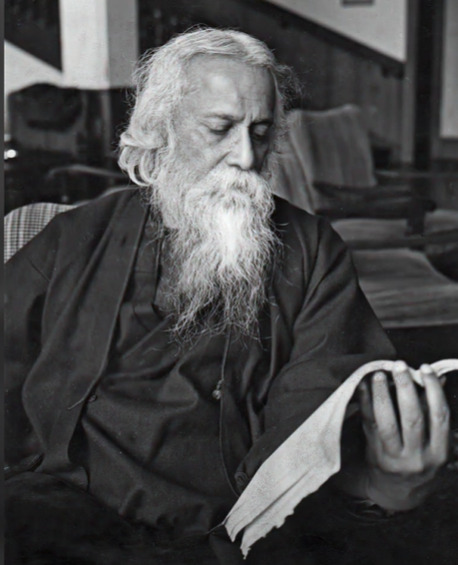
0 notes
Text
https://mediaforb.com/biography/rabindranath-tagore/
0 notes
Text
Online Bangla Book Shop, Ananda Publishers Book Online
In today’s digital age, finding and purchasing books has never been easier, and the rich world of Bangla literature is no exception. Whether one is a passionate reader, a student, or someone looking to dig deep into the Bangla classics— online Bangla bookstores offer a treasure trove of options right at your fingertips.
Shopping for Bangla books online offers several advantages:
Convenience: Browse and purchase books from the comfort of your home, avoiding the hassle of physical stores.
Wide Selection: Access a diverse range of genres, from contemporary fiction to classic literature and academic texts.
Instant Access: Many online bookshops offer instant downloads for eBooks, so you can start reading immediately.
Ananda Publishers is a renowned name in Bangla literature, offering a diverse range of books that cater to various interests, from classic literature to contemporary works. If you're looking to purchase Ananda Publishers’ books online, you’re in luck—several platforms provide easy access to their extensive catalog. In this blog post, we'll guide you on where and how to find Ananda Publishers’ books online, making your search for quality Bangla literature seamless and enjoyable.
Ananda Publishers is celebrated for its commitment to quality and its diverse range of publications. Whether you’re interested in novels, poetry, or academic texts, Ananda Publishers offers something for every reader. Their books are known for:
Rich Content: High-quality literature that spans various genres and themes.
Renowned Authors: Works by celebrated Bangla authors and emerging voices.
Cultural Significance: Books that reflect and enrich Bangla culture and heritage.
Exploring Bangla literature online opens up a world of possibilities for readers of all interests. By leveraging the convenience of online bookstores and the official website of Ananda, www.anandapub.in, one can easily access and enjoy a vast collection of Bangla books. Ananda Publishers has built a stellar reputation for its curated collection of Bangla literature. Their online platform provides a seamless shopping experience, allowing you to explore their vast inventory from anywhere in the world. Whether one is interested in classic works by Rabindranath Tagore, modern fiction, or non-fiction material like essays, biographies, Ananda Publishers’ online bookstore has something for everyone!
0 notes
Link
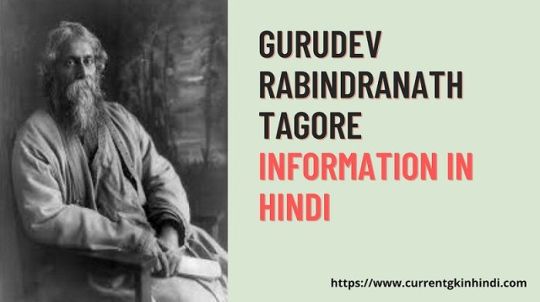
Gurudev Rabindrnath Tagore Information In Hindi Language Free PDF Download Learn Gurudev Rabindrnath Tagore Biography and History Story With Essay Or Poems.
#rabindranath tagore biography#gurudev rabindranath tagore information in hindi#rabindranath tagore life sotry in hidi
1 note
·
View note
Text
Rabindranath Tagore Biography Short
Rabindranath Tagore Biography Short: Rabindranath Tagore (1861-1941) was a renowned Bengali polymath, poet, philosopher, musician, and artist from India. He became the first non-European Nobel laureate in Literature in 1913, primarily for his collection of poems, Gitanjali. Tagore's works explored themes of love, nature, and spirituality, often reflecting his deep connection to his homeland and its culture. He was a key figure in the Bengal Renaissance and played a crucial role in shaping modern Indian literature and art. Tagore's legacy continues to inspire generations, and his contributions remain an integral part of India's cultural heritage.
0 notes
Link
कहानी पोस्टमास्टर | रबीन्द्रनाथ टैगोर की श्रेष्ठ कहानियां :- टैगोर की श्रेष्ठ कहानियां रबीन्द्रनाथ ठाकुर बंगला साहित्य में कहानियों के प्रणेता माने
#unique story#story#rabindranath tagore#rabindranath tagore biography#rabindranath thakur#postmaster#hindi sahitya#best story#shreshth kahani#tagore
0 notes
Link
0 notes